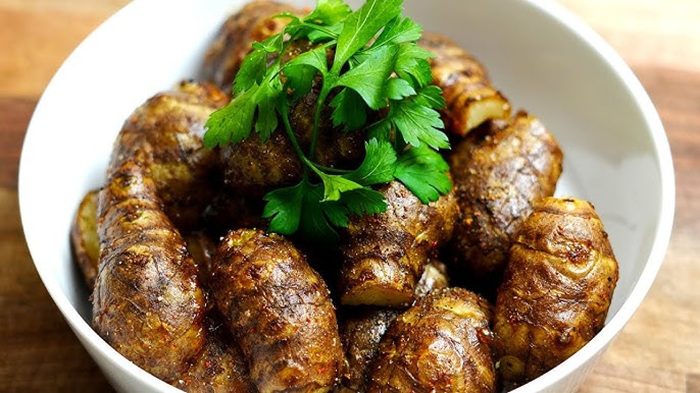Picture a chilly autumn evening in a farmhouse kitchen. The scent of roasted vegetables and herbs hangs in the air. Brown knobby Jerusalem artichokes stacked high on a wood platter. How ugly they look, ginger root-like, but scrub them up and cook them, and discover their sweet tender nutty flavor. It’s Jerusalem artichoke magic, or sunchokes.
Jerusalem artichokes are sunflower tubs and have nothing to do with Jerusalem or artichokes. Earthy, nutty sweet, crunchy and crisp raw, and great in salads. Little morsels of creamy gold when cooked. Boiled or as purée, silky and spud-like but more watery.
Subtle but powerful is this root. It enriches food, kicks food off, and anchors kitchens.
Table of Contents
Jerusalem Artichoke Recipes Fractions: Knowing

Concepts for considering Jerusalem artichoke portions as flavor units. One flavor unit will change the meal.
- 1 entire bowl roasted Jerusalem artichokes = whole family supper side dish.
- 1/2 bowl = snack or light lunch.
- 2/3 bowl = crunchier salad topping.
- 1 3/4 sliced artichokes = for a little bit of soup.
Balance. Too much artichoke and the whole dish too heavy and sweet. Not enough, and everything tastes nothing. All about balance to create them.
Change Flavor
Jerusalem artichokes are such versatiles. They can be made in so many ways. And every single one tastes differently.
- Raw salad form: Chopped herbs, lemon, olive oil, and crunch.
- Roasted type: Tossed in olive oil, rosemary, and garlic. And roasted till golden brown.
- Soup style: Bashed potatoes, onions, and cream into hot rich soup.
- Puree style: Sweet light mash version.
- Pickled style: Sliced thin and pickled in vinegar, sugar, and spice to be tangy crisp.
- Gratin style: Layered cooked in cheese and cream.
- Fried chips: Fried or air-fried golden as crisps.
With each process, the nature of the root changes. Raw is crunchy, roasted is caramel, boiled is soft, fried is crisp.
Breaking the Balance in Cooking
Balance will have to be invoked in order to bring out the best in Jerusalem artichoke recipes.
- Raw artichoke = nutty texture.
- Boiled artichoke = tenderness softness.
- Roasted artichoke = caramel sweetness.
- Fried artichoke = gold crunch.
- Pureed artichoke = silky smooth.
Mush and they’re over-boiled. Greasy and over-fried. Burning the outside occurs when over-roasting. Seasoning, time, heat balance.
Kitchen Shortcuts with Jerusalem Artichoke
Not everyone can take days off or have fully stocked pantries. Short cuts are limited prep time.
- No peeling time? Bake and wash your skin on.
- No oven to use? Pan-fry cut in olive oil.
- No cream for adding to soup? Milk, yogurt, or even broth can be used as a substitute.
- No fresh herbs on hand? Dried rosemary or thyme can be used as a substitute in small amounts.
- No knife preparation required? Thinly cut on mandoline and serve in salads or chips.
They’re rich enough in taste to be these convenience short cuts.
Why Jerusalem Artichoke Matters
Jerusalem artichokes are well worth it when nutrition and flavor become an issue.
- They’re packed with inulin, which is digestible fiber.
- They’re mineral-rich and vitamin-rich for potassium, iron, and magnesium.
- They’re low calorie and aid weight control.
- They have been enjoyed for centuries both on the European mainland and in North America.
- They are gluten-free and vegan, harmless to most diets.
Without them, there would be many idle kitchens with no tasty and healthy root vegetables to cook.
Jerusalem Artichoke Recipes in Everyday Life
Utilize these recipes in domestic kitchen:
- Roasted Jerusalem Artichoke: Combine chopped Jerusalem artichoke, garlic, olive oil, and herbs. Roast in the oven until browned.
- Jerusalem Artichoke Soup: Sauté the onions, potatoes and broth and puree to smooth.
- Jerusalem Artichoke Chips: Slice thinly, deep or air-fry until crispy, sprinkle with salt.
- Jerusalem Artichoke Puree: Boil and mash with butter and cream. It is served with meat.
From soup to salad to snack, the versatility of the root is celebrated by these recipes.
Jerusalem Artichoke in Tablespoons
It’s simpler to measure cooking in spoons.
- 1 medium artichoke = approximately 1 cup chopped = 16 tablespoons
- 1/2 artichoke = approximately 8 tablespoons
- 2/3 artichoke = approximately 10 tablespoons
- 1 3/4 artichokes = approximately 28 tablespoons
Doubling or halving a recipe is simple.
Jerusalem Artichoke and Water
Substitutions between recipes are made in cups of water.
- Two scoops artichoke = base flavour
- One scoop garlic = depth of flavour
- Half scoop herbs = aroma
- Pinch of salt = balance of taste
- Dash of oil = depth of texture
Adding water to a glass, each scoop is in balance.
Working with Jerusalem Artichoke
Jerusalem artichokes are wonderful to work with in an effort to teach.
- Demonstrate kids washing and cleaning roots in a bowl.
- Make them measure and count using spoons.
- Demonstrate roasted sweetness and raw crunch.
- Demonstrate fraction by quartering and halving.
- OK, demonstrate seasoning impact on taste.
Cooking is learning and school time for taste.
Mistakes with Jerusalem Artichoke


Don’t make these easy mistakes:
- Overcooking to mush.
- Underseasoning, nothing tastes.
- Forgetting to peel skins, grit sediment left over.
- Too much cream in soups, overwhelming too much nutty flavor.
- Too much salt, overwhelming too much natural sweetness.
Balance and patience yield the best outcome.
Why Recipes Use Quantities
Recipes most frequently ask for 1 3/4 cups or 2 cups of artichokes. Coincidence.
- Too little artichoke = nothing on the plate left.
- Too much = too rich and sweet.
- Too little herb = flat.
- Too much garlic = overpowering.
The right quantities add to flavor, texture, and nutrients.
Bite-Sized Conversion Table
- 1 artichoke ≈ 1 cup chopped
- 1/2 artichoke = 8 tablespoons
- 2/3 artichoke = 10 tablespoons
- 1 3/4 artichokes = 28 tablespoons
- 1 serving soup ≈ 1 cup
Double and halve is easy.
Jerusalem Artichoke FAQs
Q: Do they need peeling?
A: No, although a smoother texture is offered by peeling.
Q: Do they need to be cooked?
A: Raw thin slices in salad are nutty and crunchy.
Q: Do they taste like artichoke?
A: No, potato and chestnut flavor.
Q: Are they good for me?
A: Yes, low calorie and high fiber.
Q: How long do they keep?
A: Keep in a cool place, use the best fresh air within one week.
Jerusalem artichoke meals aren’t just chewing. They’re tradition, harmony, and health in a tuber. Cream soups and broiled vegetables, salads and potato chips that crunch, they have no place on no table.
The same with halves and cooking, the taste of a question. Too much, too little, supper’s ruined. So pleasant only in moderation to fullness, then.
Jerusalem artichoke is just one of those great examples that even simple roots could be turned into something complex and nutritious. Simple ingredients could be used to bring back to being good food that revives the body and overflows the table.

